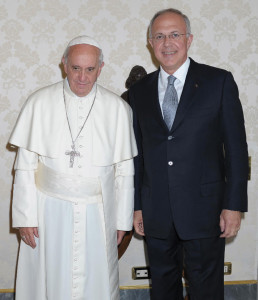Carl Anderson, Supreme Knight of the Knights of Columbus, surveys the exciting and history-changing ideas of Pope John Paul II in his 2008 book A Civilization of Love. Based on St. John Paul II’s vision and also that of his successor, Benedict XVI, Anderson seeks to inspire Christians to work toward creating a civilization of love.
In such a civilization, every person is a child of God, intrinsically valuable. The battle today is between the culture of death (where people are judged by their social or economic value) and the culture of life. By embracing the culture of life and standing with those most marginalized and deemed “useless” or a “burden” on modern society, Christians can change the tone and direction of our culture. Anderson demonstrates that regardless of our differences, we can come together on the centrality of loving and caring for others. He brings a message of inclusion and hope in the midst of a clash of civilizations and provides a road map for helping Christians understand their role in the world.
A Civilization of Love
By Carl Anderson
by Michael Severance
May 27, 2008
On March 29, 2008, Carl Anderson’s A Civilization of Love (HarperOne, 2008) first appeared on the New York Times Best Seller list as one of hottest-selling books in America among the “Hard Cover Advice” category. The author is Supreme Knight of the Knights of Columbus, the world’s largest Catholic fraternal society, and CEO of its top-rated life insurance company. Anderson brings to his writing a vast amount of practical experience combined with a knowledge of Catholic philosophy and theology to elucidate his philosophy of love and goodness.
Anderson first goal is to enlighten his readers on the very meaning of love. He dedicates his first few chapters to explain that a culture of love is not simply about encouraging romance; and in no way does a culture of love echo the loose liberal ideas behind the hedonistic behavior so vigorously idealized in Western society since the late 1960s. A culture of love is, rather, about self-responsibility, self-denial, hard work, unconditional generosity and steadfast dedication.
And yet, there is something more to love, at least in the Christian sense: Anderson’s primary axiom is that a civilization characterized by love is, above all, one which is rooted in the love of God and is ultimately other-directed. To make his point clear, Anderson revisits Descartes’ fundamental existential premise, “I think therefore I am,” to reveal a deeper insight about man and his relationships: “‘I love therefore I am.’ Or perhaps even more profoundly: ‘I have been first loved, therefore I am.’” Anderson goes on to say that “Divine love implies an other…. Love involves (at least) two persons, two selves.”
Anderson’s second point is that love is marked by the freedom to act and to give; yet it involves a personal liberty which often challenges our spontaneous preferences and natural inclinations for comfort, company and security. “[Freedom] cannot be lived in isolation, that is, unhinged from other values such as equality and human dignity.”
Anderson reflects on Mother Teresa’s struggles while experiencing her own “dark night of the soul” in caring for lepers, drug addicts and AIDS victims in the streets of Calcutta.
Mother Teresa was not rewarded every day with the joy of having improved the well-being of India’s most destitute citizens.
Many days were, in fact, quite routine and so physically taxing that it would be very wrong to speak of any “good feelings” that resulted from her unconditional acts of charity. And yet “throughout her ministry she persevered and did not begrudge her work.”
Anderson believes that promoting human responsibility, based on personal acts self-giving and firmly rooted in imitating God’s law and love for his creatures, is the only way to make a culture a civilized one.
Anderson’s book brings to light many pressing social issues affecting most modern nations. But unlike many philosophical works, Anderson provides a cause and a solution sustained by real-life examples and their consequences. I would highly recommend reading A Civilization of Love.





Facebook Comments